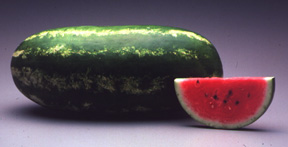Do you like Water melon?
By naman95
@naman95 (1552)
India
12 responses
@rohan1988 (98)
• India
2 Jan 10
Water Melon is my Favorite fruit off all ,i really love it it so sweet & rich in taste, i eat it whole some times had stomach problems if ate more but still i love it....^_^
@PRIYANK1992 (1677)
• India
3 Jul 08
Yes I would like to eat Water Melon.It's my favorite fruit.I would like it most ever than any other Fruit..
@anniege (202)
• China
15 Dec 09
Water melon is very good to us in hot summer,especially when you are thirsty. But have you ever tried to eat water melon in winter. It is really refresh to have some when i eat hotpot.By the way,hotpot is very popular in China and if you have some friends to treat,hotpot will be a good choice. And water melon will always come the last for good ending.
Happy mylotting.
@pramodthakur (2365)
• India
31 May 07
Hi Naman, after a long time I have seen you. Where were you ? I too love water mellon to take. It is full of water and other minerals. Fast digestive. This fruit comes only in summer what I have seen. This is very popular among all. It is cheaper in cost also. No so much expensive as other fruits.
@cuterose (1698)
• India
23 Nov 07
yes i love to eat watermelons. its very good to fill the stomach without adding calories to your body. check out the facts about watermelons:
It is a sweet and astringent fruit. Since it is cold in action, it may increase vatamins. Remember An apple a day keeps the doctor away.It tends to relieve diarrhea. Apple skin is a good source of calcium and vitamin A. The vitamin content is 5 times more in the skin than the flesh and gradually decreases towards the center of the fruit.
Watermelon is rich in carotenoids. Some of the carotenoids in watermelon include lycopene, phytofluene, phytoene, beta-carotene, lutein, and neurosporene. Lycopene makes up the majority of the carotenoids in watermelon. The carotenoid content varies depending on the variety of the watermelon. Depending on the variety, carotenoid content in red fleshed watermelon varies from 37 – 121 mg/kg fresh weight, where as lycopene varies from 35 – 112 mg/kg fresh weight.
Carotenoids have antioxidant activity, free-radical scavenging property. Several researches have reported an association between dietary lycopene consumption and lower incidence in diseases such as prostate and oral cancers. Lycopene may also help reduce risks of cardiovascular disease.
Watermelon seeds are excellent sources of protein (both essential and non-essential amino acids) and oil. Watermelon seed is about 35% protein, 50% oil, and 5% dietary fiber. Watermelon seed is also rich in micro- and macro-nutrients such as magnesium, calcium, potassium, iron, phosphorous, zinc etc.
Besides, the red flesh, in the Arab world, salted and roasted watermelon seeds are also consumed as a snack.
Vitamin A found in watermelon is important for optimal eye health, can help prevent nightblindness, and boosts immunity by enhancing the infection-fighting actions of white blood cells called lymphocytes.
Vitamin B6 found in watermelon is used by the body to manufacture brain chemicals (neurotransmitters), such as serotonin, melatonin and dopamine, which preliminary research shows may help the body cope with anxiety and panic.
Vitamin C in watermelon can help to bolster the immune system's defenses against infections and viruses and can protect a body from harmful free radicals that can accelerate aging and conditions such as cataracts.
Potassium
A two-cup serving of watermelon is also a source of potassium, a mineral necessary for water balance and found inside of every cell. People with low potassium levels can experience muscle cramps.
Watermelon carries the heart-check mark of the American Heart Association, indicating it is certified by the AHA as being heart healthy. Watermelon is certified by the American Heart Association because it is low in saturated fat and cholesterol for healthy people over age 2. This heart-check mark indicates that watermelon can be part of a heart-healthy diet.
















